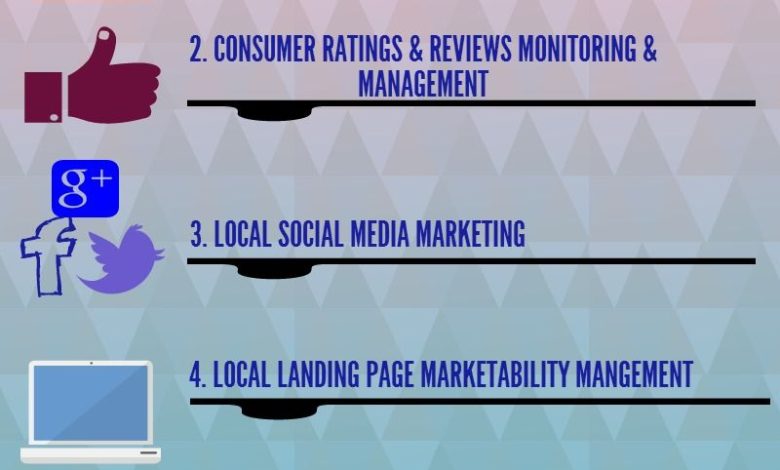
Why do companies often perceive that their local marketing efforts end once they’ve submitted a data feed through a syndicator? In reality, local marketing is a strategic, multi-channel process rather than a mere task. Using a syndicator is just the beginning.
Image source: SmartFinds Internet Marketing
This applies to both small local businesses and multi-location national companies, especially the latter as they often don’t consider themselves local businesses. National companies tend to focus their marketing and advertising on a national scale, but fundamentally, all business is local.
The internet industry, mobile industry, and consumer demands are pushing all businesses to concentrate their marketing efforts at the store, office, or franchise level.
What Is Included In Local Marketing
Although there is an extensive array of topics concerning local store, office, or franchise marketing, let’s focus on the most common ones:
-
Local Business Listing Marketing Management
This ongoing process includes pin code verification at multiple websites, updating listings with marketing materials, consistently changing those materials, managing duplicate listings, addressing closed locations, and more. -
Local Business Listing Information Marketing & Syndication
This involves completing processes via data feeds and syndication services. -
Consumer Ratings & Reviews Monitoring & Management
Each location has individual ratings and reviews from local customers. Waiting passively for negative reviews is not advisable. Instead, implement a program to gather ratings and reviews on your Google listings, including responses to both negative and positive feedback. -
Local Social Media Marketing
Maintaining a Google+ page for each location is now necessary. To foster relationship marketing specific to local consumers, also consider platforms such as Facebook, LinkedIn, Twitter, YouTube, and Foursquare. This requires active, not passive, social media engagement. -
Local Landing Page Marketability Management
Your business website is crucial in local marketing, potentially needing separate landing pages for each location and city. Using structured data in the website’s coding, these pages can enhance the overall strategy. - Auditing Monthly Analytics, Reporting, Communications, and Problem Solving
This involves reviewing measurements per location, analyzing results, identifying problem areas, and developing action plans for improvement.
Auditing Local Store Marketing Effectiveness
Strategic marketing processes include auditing to assess their effectiveness. This is something many syndicators do not offer. Some basic questions to ask during an audit include:
- Have you checked whether an individual store ranks for a keyword plus city combination in and around that city?
- Have you verified that your listings are in the correct category across various websites your information is syndicated to? Don’t forget to check Google Map Maker; it can sometimes reveal surprises.
- Not all websites accept data feeds the same way; some information might be missed or not properly updated.
Auditing involves problem-solving to identify and correct issues, requiring time and labor to research and take corrective action.
Yext and What Can Happen If You Stop Using the Service
In June 2013, a LinkedIn group discussion about "Is Yext worth it for citations?" generated over 50 comments, mainly focusing on what happens when you stop using Yext. The consensus was against using Yext because ceasing the service might result in losing business listings, citations, and syndicated information.
A representative from Yext noted that once a client stops using the service, the publishers revert to their normal compilation process. This suggests that data feed syndication services offer short-term gains akin to advertising rather than long-term marketing investments.
Pin Code Verified Listings Are Not Managed By Syndicators
Syndication companies do not typically offer pin code verified listings. Businesses need to secure pin codes from various websites, including Google, Bing, and Yelp, to verify their listings, which reduces the risk of hijacking.
Bulk uploaded location lists don’t necessarily prevent hijackings. An example from January 2014 showed thousands of hotel listings being hijacked on Google, indicating the need for tighter security measures that businesses must manage proactively.
What We Have Learned
Data feed syndication marks the beginning, not the end, of a comprehensive local marketing strategy. The strategic marketing process must include a multitude of components to compete effectively and reach local consumers.
Featured image credit: SmartFindsMarketing.com




